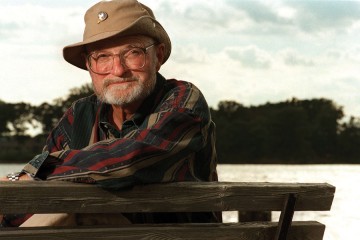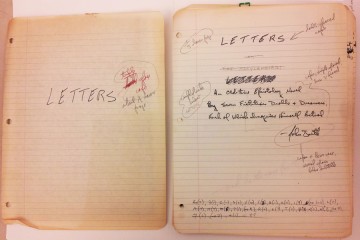John Barth's fiction and career have famously defied convention. Following suit, the Sheridan Libraries' new exhibition on Barth offers visitors a kind of funhouse experience devoted to exploring the author's life and legacy.
Lost and Found in the Funhouse features highlights from the John Barth Collection, which documents the creative output and career of John Barth, the American fiction writer, essayist, and teacher. Barth, a National Book Award winner, was a leading figure in the university's Writing Seminars department, and his work is central to postwar American literature, especially the development of the contemporary novel, the articulation of international postmodernism, and the literary identity of Maryland's Eastern Shore.
The exhibition opening takes place on Sunday at 2 p.m. in the George Peabody Library and will feature remarks from three writers who were Barth's students during his tenure as professor in the Writing Seminars: Jean McGarry, Michael Martone, and ZZ Packer. Barth and his wife Shelly will be present at the opening as guests of honor.
Barth is the author of 17 novels and collections of short fiction and three collections of essays, including The Floating Opera (1956), The End of the Road (1958), The Sot-Weed Factor (1960), Giles Goat-Boy (1966), Lost in the Funhouse (1968), Chimera (1972), LETTERS (1979), The Friday Book (1984), The Tidewater Tales (1987), The Last Voyage of Somebody the Sailor (1991), The Book of Ten Nights and a Night: Eleven Stories (2004), The Development: Nine Stories (2008), and Every Third Thought: A Novel in Five Seasons (2011). In 1973, he won the National Book Award in fiction for Chimera; in 1997, he received the F. Scott Fitzgerald Award for Outstanding Achievement in American Fiction, and in 1998, he received both the Lannan Foundation Lifetime Achievement Award and the PEN/Malamud Award for Excellence in the Short Story.
Born in Cambridge, Maryland, Barth earned his bachelor's degree in 1951 and his master's degree in 1952 from Johns Hopkins University. Before returning in 1973 to teach at his alma mater, he held appointments at the Pennsylvania State University and the State University of New York at Buffalo. Barth became professor emeritus at Johns Hopkins in 1995 and was afterwards a senior fellow at Washington College in Chestertown, Maryland. He received an honorary Doctor of Humane Letters degree from Johns Hopkins in 2011.
"John Barth has helped shape the literature of the 20th and early 21st century," said Winston Tabb, Sheridan Dean of University Libraries and Museums. "He has also played a seminal role in the education of many writers through his decades of teaching. We are very pleased to be the stewards of a collection so closely tied to the history of the university and the life of a beloved professor, and we are excited to share the collection through this exhibition."
The exhibition features highlights from the John Barth Collection at Johns Hopkins, which contains the notes and manuscripts for most of Barth's published writings and lectures, correspondence between Barth and other major literary figures, most of the English-language editions of Barth's work, and many translations, as well as anthologies, journals, and works of criticism that include Barth's work or scholarship about it. In addition, the collection includes the Barths' 1,200-volume library: books belonging to Barth from his student days, with his annotations; books inscribed by students, colleagues, and important writers of the past several decades; and books that were instrumental to Barth in his own writing. The collection also includes photographs, recordings, juvenilia, and homemade posters and slides that Barth used to illustrate talks and readings.
"Shelly and I are happy to have these materials at Johns Hopkins," John Barth said. "JHU has been of great importance to me—first as an undergraduate and graduate student, and later as a professor in the Writing Seminars, ... and it remains so today. When I matriculated in 1947 as a 17-year-old freshman from Maryland's lower Eastern Shore … I was lost in the funhouse indeed; but thanks to good classmates and great professors, I managed to find my way, and in time my calling as a writer and a teacher."
Added exhibition curator Gabrielle Dean, curator of literary rare books and manuscripts in the Department of Special Collections at the Sheridan Libraries: "The aim of this exhibition is a gallery experience that reflects the imaginative spirit of Barth's fiction. His writing is full of funny word play and puzzles for the reader to work out. It's often very game-like. We have tried to transfer some of those qualities to the physical space. Barth is also very aware of medium. He experiments with the possibilities of printed text as a medium, with how to perform his work in recordings and public readings. In honor of his media savvy, we've worked with a couple of filmmakers to produce short videos that convey the liveliness of his writing and the excitement of what we've found in his archive."
Lost and Found in the Funhouse is made possible in part through generous support from the CSX Foundation in memory of Steven Muller, president of Johns Hopkins University from 1972 to 1990. The exhibition runs through Feb. 28, 2016, at the George Peabody Library, 17 E. Mount Vernon Place, Baltimore, MD 21202. The George Peabody Gallery is open Monday through Friday 9–5, Saturdays 9–1, and Sundays 12–5. Admission is free.
Posted in Arts+Culture
Tagged writing seminars, sheridan libraries, writing, john barth









